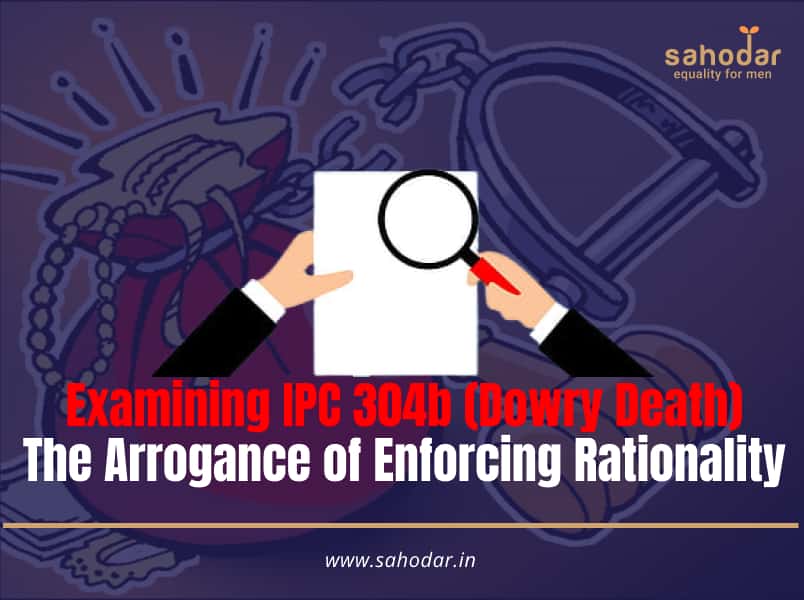IPC Section 304b, commonly referred to as “dowry death”, is a legal provision that states the following:
This provision applies when a woman dies within seven years of her marriage due to burns, bodily injury, or under unusual circumstances, and it is found that she was subjected to cruelty or harassment by her husband or a relative of her husband for, or in connection with, demands for dowry prior to her death. In such cases, the husband or relative will be held responsible for causing the woman’s death. The term “dowry” has the same meaning as described in section 2 of the Dowry Prohibition Act, 1961 (28 of 1961). Anyone who commits “dowry death” may face imprisonment for a minimum of seven years and up to life.
At the time when a new section numbered 113b was added to the Indian Evidence Act, a provision similar to “dowry death” was also introduced. The newly added section 113b stipulates the following:
“When the question is whether a person has committed the dowry death of a woman and it is shown that soon before her death such woman had been subjected by such person to cruelty or harassment for or in connection with any demand for dowry, the court shall presume that such person had caused the dowry death.”
One striking feature of these laws is the use of the phrase “soon before,” which highlights the poor quality of legislative drafting in India. The person who drafted the law failed to consider more appropriate phrases such as “just before,” “some time before,” or “shortly before” and instead insisted on using “soon before,” which creates confusion and ambiguity. It is unclear how something can happen “soon before” something else, and this inconsistency in language is evident to all English-speaking individuals who lack a time machine.
This issue exposes a larger problem in India’s lawmaking process, which is that Parliament appears to merely serve as a rubber stamp for the ruling party’s leader. The leader’s decisions are implemented without much input or review from the members, who may not even bother to read the text of the bills that are brought before the legislature.
This is not a surprising situation, given that laws are written in English, which is not the native language for many members of Parliament. Even sixty-six years after gaining independence, only a small proportion of the literate population has a good command of the language used to govern the country. This problem is negligible in proportion to the total population of India.
However, can this be considered a sufficient justification? Were there no proficient English speakers in the Parliament who could have corrected the flawed phrasing while the law was under review? And have there been no influential individuals in the 27 years since the implementation of this provision of the Indian Penal Code who have scrutinized it and questioned how the world’s largest democracy can allow incomprehensible language in its criminal laws? This is worrisome since the letter of the law is the law, unless it comes across mavericks like Katju and Sinha who famously declared that another law was unhappily worded, and reiterated the well-established jurisprudential principle that absurd interpretations of the law cannot be accepted. I am referring to the Batra v. Batra ruling in a case involving a significant provision of the PWDVA 2005.
(In 2009, a bench of Arijit Pasayat and Asok Kumar Ganguly actually blunted Section 113B. But the phenomenon that afflicts the legislature and is discussed in this article is persistent.)
This raises another, even more critical question. If the lawmakers who passed this law did not detect a linguistic error in it, can we be entirely certain that they did not investigate the rationale behind the law and the potential harm it might cause in the future (which it indeed has)?
Another problematic and intriguing phrase here is “Whoever commits dowry death.” How can someone commit death? It is possible to kill someone and commit murder (or culpable homicide, to extend the definition) as a result, but really, committing death? This awkward phrasing stems from the audacious dictated assumption that “the husband or relative shall be deemed to have caused her death.” No matter how you try to interpret this statement, the interpretation that can be derived from it is always that of a homicide accusation.
The accuser in this scenario can take different approaches to frame their accusation against the husband. While an honest but foolish accuser would directly accuse the husband of murder, a cunning accuser would use a more strategic approach by saying that the husband is “responsible for the wife’s death.” This is because it is not legally valid to equate harassment with murder, and using such language could lead to accusations of stupidity. A sneaky accuser would use the term “dowry death” to avoid using the word “murder,” which would be legally problematic for them. However, this new category of offense is purely an intellectual construct and has no basis in reality. It is not fair to legislate compulsory assumptions or presumptions of guilt, as this goes against the basic principles of justice for all in a democratic society. The reasons for such unjust laws can be traced back to the media’s desire for higher circulation and revenue, which led to sensationalist campaigns and a focus on generating profits over genuine news reporting.

